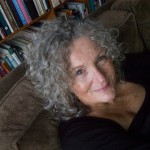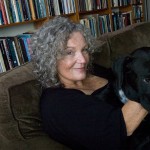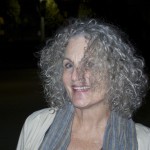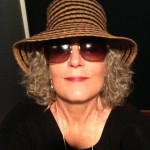Biography
 Jane Vandenburgh is the acclaimed author of two novels, Failure to Zigzag and The Physics of Sunset, the nonfiction book, Architecture of the Novel: A Writer’s Handbook, and the intertwining memoirs, The Wrong Dog Dream and The Pocket History of Sex in the Twentieth Century.
Jane Vandenburgh is the acclaimed author of two novels, Failure to Zigzag and The Physics of Sunset, the nonfiction book, Architecture of the Novel: A Writer’s Handbook, and the intertwining memoirs, The Wrong Dog Dream and The Pocket History of Sex in the Twentieth Century.
As a fifth-generation Californian, she says, “My writing concerns itself with place — both temporal and geographic — and how place acts as a character in your personal history. I’m interested in what it’s been to be a Westerner and female and a member of Generation Huge, those 77 million of us who came of age just as the Civil Rights and antiwar movements began to cause cultural changes so huge as to be called a revolution. I had an extraordinary childhood in which I had lost both my parents by age ten and was then raised by an aunt and uncle. What I’ve lately come to realize is how ordinary my childhood now seems, in that that kind of gigantic loss and dislocation happened to so many it’s been called The Unsettlement of America by Wendell Berry.”
She has taught literature and writing at U.C. Davis, at Georgetown and at the George Washington University in Washington, DC, and most recently, as Distinguished Writer-in-Residence at St. Mary’s in Moraga, California. She published her long-awaited book on the craft of writing the longer narrative called The Architecture of the Novel in January, 2010 and teaches a year-long course in the book-length narrative project — novel, memoir, book of connected stories — through Fishtrap, a writers’ community in Enterprise, Oregon. For more information contact about the course fishtrap.org.
Married and the mother of two children, she lives in Point Richmond, California.
Image Gallery
- © Madeleine Tilin
- © Madeleine Tilin
- Raymond Holbert Photography
- Self-potrait
Interview with Linda Gray Sexton
Can you describe “the wrong dog dream” for us, so readers know what it is, and tell us how you decided to use this metaphor to write a memoir?
Wrong Dog was a collective dream, a shared family phenomenon. Somebody initially dreamed it, then described it vividly at the breakfast table, then each of the four of us began elaborating his or her own personal version of the dream.
And though comic on its surface, the work of the dream was also to carry an undercurrent of helpless sorrow and anguished loss: We’d have left our dog, gone to pick him up, someone official appeared, bringing the wrong dog out to us. The dreamer recognizes the error but, because he’s sleeping, can’t get the words out, can’t speak to be understood, so keeps slurring rrrggg dggggg more and more frantically.
That ghastly feeling of threatened loss translated to me as a warning that beneath the overlay of any seemingly ordinary occurrence there existed the possibility that nothing was as it seemed.
And what was particularly interesting to me was – in the storytelling manner– that it was personalized as it was re-dreamed and elaborated. In my dream, it concerned our need to pick our dog up from boarding. When my son dreamed it, it was our dog trainer’s leading some monstrous big-as-a-horse English mastiff, toward us, its face full of wrinkles, the trainer’s insisting that this ugly dog was ours. In my daughter’s version we were getting our English Springer from the groomer who’d mistakenly shaved him like a poodle so he was hardly recognizable.
The dream evolved into a private shorthand for that horror-movie body-snatcher-ish feeling in which a transformation of your loved one has taken place, like Jack Nickolson in “The Shining.” Your intimate’s not being who he purports to be is a disquieting feeling I knew well from having gone through a divorce, as the ways people – all people – act when they’re getting divorced are often completely shocking.
But even more archaically I knew this terrifying sensation from growing up in a crazy family in which certain members suffered from such profound mental illness that they’d seem at times to change in odd, completely unpredictable and unfathomable ways.
It evolved that the Wrong Dog Dream came to stand for the animal version of that primordial fear, a loved one becoming vicious and angry, turning into a wild animal, like in Dr. Jeckel and Mr Hyde. So when Thiebaud – our second dog – began to exhibit signs of aggression I thought: Oh no, not this again!
You refer to “dog mania” in our society. Why do you think this is occurring?
It appears to me that dogs now carry some of the same cultural weight as symbols of money and privilege that horse ownership once did. Having horses equates to deep old wealth, those who have Old Money have the wherewithal to ride to hounds over the Piedmont in a Virginia foxhunt, their purebred dogs running right there along with them as signifier.
For all our wish to be democratic we are a remarkably class conscious and insecure society, this being as old as the America written about by Thorstein Veblen in his Theory of the Leisure Class.
But until the middle of the 20th century, a majority of Americans still lived in their semi-agricultural home places, their dogs and horses kept as working animals whose existence in their lives served an economic purpose. In the aftermath of World War Two vast numbers of country people resettled by moving off the land and into the quickly growing cities, bringing animals as totems perhaps, of some slightly fictitious past now being nostalgically misremembered.
It was when we stopped owning flocks and herds and packs of animals that we’d began singling out one or two dogs who’d sleep at the foot of our beds and be named by us as intimate members of our families. As soon as an animal has a name he starts to carry an important part of our own dramatic and intimate narrative, which is as old as Homer and has always to do with recognition. It’s his hound Argus who first understands that the bedraggled stranger is Odysseus when he finally makes it home.
When we got Whistler and he became a kind of cornerstone of the new family we were creating, neither my husband nor I had much experience in owning a pet with caste/class freight that seemed to attend our having this upper class dog. We took our purebred AKC English Springer Spaniel out for walks in our toney Northwest Washington neighborhood, and were just continually blown down by the nods and winks of recognition, as these felt like prep school secret handshakes.
What? we’d think, who, us? Jack and I’d shake our heads at being so continually misunderstood. Our current life was in dramatic contrast to his and my growing up in the rag-tag neighborhoods of our separate Southern California childhoods. During the 1950s folks were streaming in from all over the country to work in the aircraft factories, a time of prosperity as well as enormous social fluidity, when large areas of the L.A. Basin were still unincorporated and there were no sidewalks and grandmas lived in camp trailers parked in the backyards of tract houses and there were no leash laws and we ran barefoot and free and were independent of the rules and there was no such thing as a hovering parent, as we were only responsible to one another, company formed of packs of kids and dogs.
But now dog ownership – like being a parent – has changed and now seems to have entered a new time of commodification, this brought about by growing scarcities of resources. Having a dog, particularly one of an obviously expensive breed, is now an indicator of achieved and secure affluence.
Your classy pet says you’ve arrived in that socio-economic place of lesser aristocracy where the living is easy. It’s Fat City, 1899 all over again, which is when Theory of the Leisure Class came out, another Gilded Age in which a tiny number of Haves own everything and those who identify with them flaunt it.
Having an expensive dogs says you’re the boss of your life, that you have the wherewithal to care for this costly animal, to pay for his food and vet bills, his grooming, teeth cleaning, daycare, to say nothing of the fact that you have the time to walk him, enjoy him, loll about and play with him.
Among those things The Haves have always had is huge packs of dogs, those lords and ladies of England imagining their having lots and lots dogs as their god-given right, what else to do with all that land but let their dogs run? This aura of dog-land entitlement redounds to us in the ludicrous extremes we see in the Westminster Dog Show, in which we – as a society –spend billions of dollars on our dogs while so many of our society’s children live in poverty and go without adequate health care and good food and quality education.
Hotel Heiress Leona Helmsley who was notoriously brutal to her personal staff and shockingly cheap to employees left something like 150 million dollars for the care and upkeep of her dogs. You wonder what species a person like that imagines she belongs to and pray there’s a certain dogless circle of hell reserved for her.
As a society we seem to rejoice in our shelling out huge amounts of money on the Upper Class Dog’s Lifestyle Appurtenances, leashes made of ostrich skin or the divan dyed to exactly match the two Weimereiners who lay on it, all of it vulgar, no matter how carefully done it is as – given the state of the actual world – this is nothing but conspicuous consumption.
Because, dogs – as all dog owners know – are too sensible and well-grounded to even notice all that, let alone to care about it.
You described your father’s suicide in humorous terms, even though it is clear that it was incredibly traumatic for your childhood family. With the shock of Whistler’s sudden death, did the loss of your father reverberate in some particular way?
It’s a commonplace that humor makes the unbearable bearable. Because we were an extremely humorous and talkative family – it might be said we were even gymnastically articulate, in that we played with language the way others might do handstands on the monkey bars — we mimicked and mocked and laughed together to ward off the disapproval that was all around us, as we did not fit in and those were exceedingly conformist times.
My father’s death was such a sundering blow that my entire natal family was, in fact, blown apart by it.
All suicides in our Judeo-Christian society, are scorned and pitied and despised – indeed, my father could not be buried in consecrated ground according to the tenets of the faith of the Episcopal Church at that time so he was cremated, without a memorial service, his ashes scattered in what was described to us at the time as “a beautiful garden.”
And our father was not just a suicide, he was also a sexual renegade who’d been arrested in gay bars and sent to the mental hospital to be “rehabilitated,” these hospitalizations being one of the precipitating factors in his taking his own life.
Who was to stick up for him, be proud of who and what he was, if not for my mother, my brothers and me? To do this we used humor as our private language.
Humor, in fact, was the glue that bonded my family together over time and distance when we had little else – I’ve written about this at length most recently in my memoir A Pocket History of Sex in the 20th Century, published four years ago. Humor became a kind of immigrant dialect, never mind that our family had been on this continent since 1644.
The degree to which those two tragically echoing events – the loss of my father when I was nine, then the death of my dog all those years later – seemed related was in the way each felt ominously foretold. The dream said we’d lose Whistler in just the way we did. I’d also dreamed of losing my father before his death, though this was a dream of his death by drowning, which made no sense, since he was a lifelong sailor, excellent swimmer, completely at home on the water.
Obviously I react to all loss post-traumatically, with the sense of on-going catastrophe as is typical of those who’ve experienced childhood tragedy such as mine.
From my dad’s death I learned that something terrible happening will very often lead to more terrible things taking place: our dad died, we were largely ostracized by our extended family, and within months our mother was committed to a mental hospital where she stayed for rest of the time we were growing up. My older brother was sent away to boarding school. My younger brother, who had developmental problems, became increasingly disturbed, violent, untrustworthy and was eventually lost to us all, disappearing as a still young man into the streets in a fog of drugs and alcohol.
For me the logic went like this: Lose your dad, lose your house, home, school friends, neighborhood, your entire extended family and all sense of who you are. What I still had, at least for a little while, was my dog.
Objectively, of course, the two events – my dad’s suicide and my dog’s dying in boarding — couldn’t be more different. My father died by his own hand while our dog death’s was caused by the neglectful behavior of someone who said she was adequate to the job of taking care of him. My dad, in dying as he did, hurt nobody else — at least not physically — but my dog was utterly dependent on the woman who failed to look after him as she had promised.
So I felt justifiably enraged by both her carelessness and by her callously inhuman attitude, as she belligerently refused to exhibit any compassion toward our dog or toward us. I also knew I could not begin feeling sane and stable again until I’d worked on forgiving her, which I enacted – as ever – through my novelist’s understanding of her and her plight as a single parent trying to get by in a cruel, harsh world.
When you were transplanted from California to Washington, DC, you experienced a terrible sense of dislocation and bonded with Whistler in your loneliness. You also say you identified with Thiebaud because you were each “orphans.” Do you think we all identify with our dogs, or just the special ones in which we see ourselves?
I have, as a writer, a mother, daughter, sister, colleague, friend, developed what is simply the kind of novelistic empathy I spoke of above in regard to the kennel women. This probably derives from my early need to understand my troubled parents so I’d be able to go on loving them even as they proved so continuously disappointing.
But I have also simply always been interested in others and I was probably born this way. The joke in my family was that I’d turn to gape at people in restaurants. I’d stare at anyone: old people, little ones, babies, kids who styled themselves as surfers or greasers or hoods, poor people, rich folks, odd people, ones who seemed to be deformed, but – and maybe especially — at those who looked and acted and seemed to really very intensely normal.
How, I probably wondered, does anyone end up like that?
I was interested – I think – in how those who seemed so different are actually like me, always looking, as my dog does, for recognition. Toward that end I’ve always watched intently and listened well, inhabiting a storytelling situation as someone physically attentive and on alert to the story’s possibilities. I seem to have been put on earth with a sense of memory as witness and used these empathic connections in both my fiction and nonfiction.
The only animals I’ve ever known well have been the dogs with whom I spend my hours and days and years, and, yes, I do become identified with them. My brothers and I – when I was a little girl – seemed to be looked after by our dogs as if it was they, instead of our neglectful parents, who were raising us.
I am interested in the dogs — I love them and recognize them individuals. So yes, I do find aspects of myself in my dogs. I saw myself in Whistler’s being withdrawn, aloof, neurotic, and suspicious even as I also identified with Thiebaud’s gregarious over-enthusiastic and easily sociable nature, as I share all these seemingly contradictory traits.
Because of the patchwork way in which I was raised I’m adaptable to all kinds of circumstance and have been both comfortable and poor, an insider, an outsider, and was, when young, both the beloved privileged daughter of wellborn parents as well as the penniless orphan and emancipated minor so poor during her college years she couldn’t afford to buy a coat.
This complexity is, I believe, true of all of us: We look for ourselves in others, as this is our most direct way into our own best natures and without it — as artists, as people, as living beings on this earth — we are lost.




